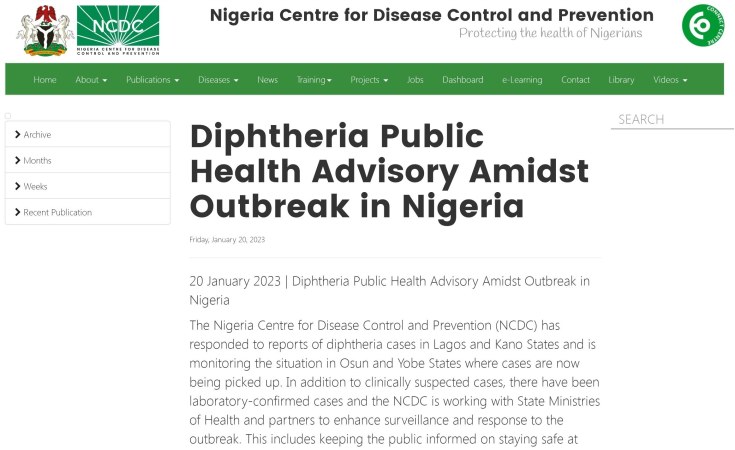The Kano State commissioner for health, Dr Aminu Tsanyawa, recently confirmed the outbreak of the deadly diphtheria disease which is reported to have killed no fewer than 25 persons in the state.
The commissioner, who confirmed the outbreak, said the state emergency preparedness committee was currently meeting to evaluate the casualty figures, review the data and measures to address the situation.
Tsanyawa said, presently, the state rapid response team had been reactivated and had set in motion an action plan to check the spread of the deadly disease in the state.
He said the low routine immunisation blamed for the spread of the disease is due to the hard-to-be-reached areas in the state.
In the considered opinion of this newspaper, the neighbouring states should guard against this deadly disease before it becomes an epidemic in the north west or the entire country .
Sadly , the death of 25 persons in Kano has served as a stark reminder of the importance of maintaining herd immunity and staying vigilant against the spread of this and other preventable diseases.
It is instructive to note that one of the most effective ways to prevent the spread of diphtheria is through vaccination.
According to reports, despite the benefits of childhood immunisation, routine vaccination coverage for all, recommended Expanded Programme on Immunisation (EPI) vaccines has remained poor in Africa with countries such as Nigeria remaining at 31 per cent, 2018; Ethiopia (43 per cent, 2019), Uganda (55 per cent, 2016) and Ghana (57 per cent, 2014).
Regrettably, vaccine-preventable diseases are still the most common causes of childhood mortality, with an estimated three million deaths every year, mainly in Africa and Asia.
According to a study entitled, 'Factors influencing childhood immunisation uptake in Africa: a systematic review' and published in the journal, BMC Public Health, an estimated 29 per cent deaths among children aged zero to 59months were due to vaccine-preventable diseases.
For Nigeria to combat diphtheria and other infectious disease, our health authorities need to do more to increase the rate of vaccination in the country.
Pointedly, the World Health Organisation ( WHO)recommends that all individuals, particularly children, receive the diphtheria, tetanus and pertussis (DTP) vaccine as part of their routine immunisation schedule.
This newspaper strongly suggest that the federal government, in partnership with international organisations, must ensure that all eligible individuals in the country have access to this life-saving vaccine.
In addition to vaccination, it is essential to raise awareness about the symptoms and transmission of diphtheria. This includes educating people on how to recognise the early signs of the disease, such as sore throat, fever, and difficulty in swallowing, as well as how to prevent its spread by practising good hygiene and avoiding close contact with infected individuals.
Furthermore, it is important to strengthen the country's surveillance and response systems to quickly identify and contain outbreaks. This includes providing adequate resources and training for health care workers, as well as establishing effective communication channels between health authorities and the public.
It is also important to note that diphtheria disproportionately affects people who live in poor and marginalised communities.
In a country where 133 million Nigerians are poor, a majority of the citizens are susceptible to this deadly bacteria disease.
Also in the north-east, there are currently 1.9 million people displaced from their homes. Sixty percent of them are children, with one in four under the age of five. An outbreak of diphtheria in Internally Displaced Persons ( IDPs) will spell doom for the country .
Consequently, it is crucial that the government and international organisations take steps to address the underlying social and economic determinants of health, such as lack of access to clean water, sanitation, and proper housing, that contribute to the spread of the disease.
The outbreak of diphtheria in Kano is a tragic reminder that we cannot afford to be complacent when it comes to preventing and controlling the spread of preventable diseases.
In view of the foregoing , the federal and state governments must take immediate and decisive action to protect the health and well-being of all Nigerians. This includes increasing access to vaccination, raising awareness about the disease, strengthening surveillance and response systems, and addressing the underlying social determinants of health.


